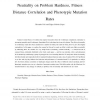Free Online Productivity Tools
i2Speak
i2Symbol
i2OCR
iTex2Img
iWeb2Print
iWeb2Shot
i2Type
iPdf2Split
iPdf2Merge
i2Bopomofo
i2Arabic
i2Style
i2Image
i2PDF
iLatex2Rtf
Sci2ools
86
Voted
TEC
2012
2012
The Effects of Constant and Bit-Wise Neutrality on Problem Hardness, Fitness Distance Correlation and Phenotypic Mutation Rates
Kimura’s neutral theory of evolution has inspired researchers from the evolutionary computation community to incorporate neutrality into Evolutionary Algorithms (EAs) in the hope that it can aid evolution. The effects of neutrality on evolutionary search have been considered in a number of studies, the results of which, however, have been highly contradictory. In this paper, we analyse the reasons for this and we make an effort to shed some light on neutrality by addressing them. We consider two very simple forms of neutrality: constant neutrality — a neutral network of constant fitness, identically distributed in the whole search space — and bit-wise neutrality, where each phenotypic bit is obtained by transforming a group of genotypic bits via an encoding function. We study these forms of neutrality both theoretically and empirically (both for standard benchmark functions and a class of random MAX-SAT problems) to see how and why they influence the behaviour and performance ...
| Added | 29 Sep 2012 |
| Updated | 29 Sep 2012 |
| Type | Journal |
| Year | 2012 |
| Where | TEC |
| Authors | Riccardo Poli, Edgar Galván López |
Comments (0)

